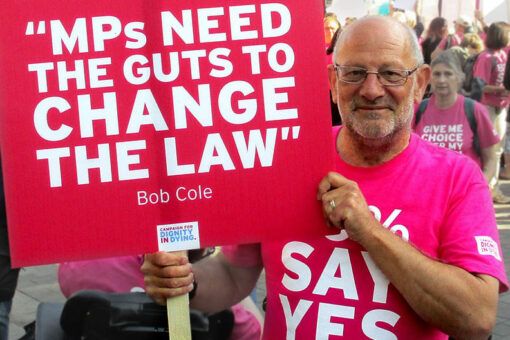Campaign comes to Manchester

The group has been set up by Mick Murray and Jen Wilson, who are campaigning in memory of loved ones to allow terminally ill people to die with dignity. The group’s first meeting will take place on Thursday 19th January at Friend’s Meeting House on Mount Street at 6.30pm and anyone is welcome to attend.
The new group is supporting Dignity in Dying in calling for a change in the law to give terminally ill people choice and control at the end of life, including the option of assisted dying. Local people are invited to come along to the first event on the 19th to learn more about the campaign, hear from people with personal experience of the issue and brainstorm ideas for campaigning in the area.
Mick became involved in the campaign after two dear friends from Manchester, Ann and Bob, became gravely ill. Ann was diagnosed with progressive supra nuclear palsy, a rare, incurable condition, and it soon became clear to her that she would be unable to have the dignified death she wanted in the UK. In 2014, Ann decided to travel to Dignitas in Switzerland for an assisted death. Just 18 months later her husband Bob travelled there himself, having been diagnosed with terminal mesothelioma, an aggressive form of lung cancer. Bob bravely chose to document his final days in a national newspaper in order to bring much-needed attention to the issue.
Mick explained:
“I had two close friends with terminal illnesses who were each forced to go to Dignitas. All they wanted was to die peacefully at home with their family and friends. The law has to change – sadly too late for Bob and Ann, but for other terminally ill people in this country and the 82% of the public who support assisted dying.”
Jen’s support for the campaign came from seeing her father suffer at the end of his life.
Jen said:
“My dad had cancer for ten years, and during the last two years he suffered a lot. He unnecessarily endured intrusive medical procedures which prolonged his life but not the quality of it. In the last few months of his life when he was bedridden and on morphine he asked me help him end his life. I have to say I was very close to respecting his wishes. I became involved in Dignity in Dying shortly afterwards because no one should have to go through this. My father was a proud man and it should have been his right to say enough is enough.”
Dignity in Dying campaigns for a change in the law to allow terminally ill, mentally competent adults with less than six months to live to have the option of a safe, legal assisted death.
Fran Hall, Campaigner Support Officer at Dignity in Dying, said:
“We believe that everyone has the right to die with dignity and have choice and control at the end of life, but sadly this is not the case for terminally ill people in this country. Instead many dying people are forced to suffer in their final months or take drastic action to wrestle back control – either by ending their own lives at home, frightened and alone, or travelling abroad for an assisted death at great financial and emotional cost.
“If you agree that this is unacceptable, please join us. Anyone is welcome to come along to our meeting on the 19th, whether you want to help or just learn more about the campaign. No experience is necessary, just bring passion and enthusiasm! Together we can make change happen and give terminally ill people the dignity they deserve.”
RSVP: Please contact activism@dignityindying.org.uk
When: Thursday 19th January at 6:15pm (for 6:30pm start)
Where: Friends’ Meeting House, Manchester, M2 5NS
***ENDS***
For more information please contact Ellie Ball, Media and Campaigns Officer at Dignity in Dying at ellie.ball@dignityindying.org.uk or 0207 479 7732.
Notes to Editor
Dignity in Dying campaigns for greater choice, control and access to services at the end of life. It advocates providing terminally ill adults with the option of an assisted death, within strict legal safeguards, and for universal access to high quality end-of-life care.